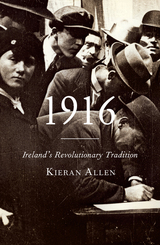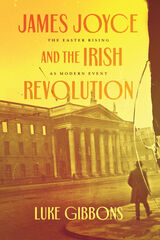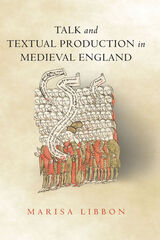
In 1916, Kieran Allen argues that this pivotal moment in Irish history has been obscured by those who see it only as a prelude for a war of independence. Emphasizing an often ignored social and political radicalism at the heart of the rebellion, he shows that it gave birth to a revolutionary tradition that continues to haunt the Irish elite. Socialist aspirations mixed, and sometimes clashed, with the republican current, but both were crushed in a counterrevolution that accompanied the Anglo-Irish treaty of 1921. The result today is a partitioned Ireland that acts as a neoliberal tax haven for multinational corporations—a state of affairs quite alien to both Connolly’s and Pearse’s vision.
Published to coincide with the Rising’s centennial, 1916: Ireland’s Revolutionary Tradition re-establishes the political role of socialist republican figures, offers a highly accessible history of the Easter Rising, and explores the militancy and radicalism that continues to haunt the Irish elite one hundred years later.

On Easter Monday 1916, while much of Dublin holidayed at the seaside and placed bets at the horse races, a disciplined group of Irish Volunteers seized the city’s General Post Office in what would become the defining act of rebellion against British rule—and the most significant single event in modern Irish history. By week’s end, the rebels had surrendered, and the siege had left the once magnificent GPO an empty shell—and turned it into the most famous and deeply symbolic building in all of Ireland.
This book unravels the events in and around the GPO during the Easter Rising of 1916. Drawing on participant and eyewitness accounts, diaries, and newspaper reports, Clair Wills recreates the harrowing moments that transformed the GPO from an emblem of nineteenth-century British power and civil government, to an embattled barricade, and finally to a national symbol. What was it like to be trapped in the building? To watch, and listen to, the destruction of the city? Was the act meant as a bloody sacrifice or a military coup d’état? Exploring these questions as they were experienced and understood then and later, her book reveals the twists and turns that the myth of the GPO has undergone in the last century, as it has stood for sacrifice and treachery, national unity and divisive violence, the future and the past.


When revolutionaries seized Dublin during the 1916 Easter Rising, they looked back to unrequited pasts to point the way toward radical futures—transforming the Celtic Twilight into the electric light of modern Dublin in James Joyce’s Ulysses. For Luke Gibbons, the short-lived rebellion converted the Irish renaissance into the beginning of a global decolonial movement. James Joyce and the Irish Revolution maps connections between modernists and radicals, tracing not only Joyce’s projection of Ireland onto the world stage, but also how revolutionary leaders like Ernie O’Malley turned to Ulysses to make sense of their shattered worlds. Coinciding with the centenary of both Ulysses and Irish independence, this book challenges received narratives about the rebellion and the novel that left Ireland changed, changed utterly.
READERS
Browse our collection.
PUBLISHERS
See BiblioVault's publisher services.
STUDENT SERVICES
Files for college accessibility offices.
UChicago Accessibility Resources
home | accessibility | search | about | contact us
BiblioVault ® 2001 - 2025
The University of Chicago Press









